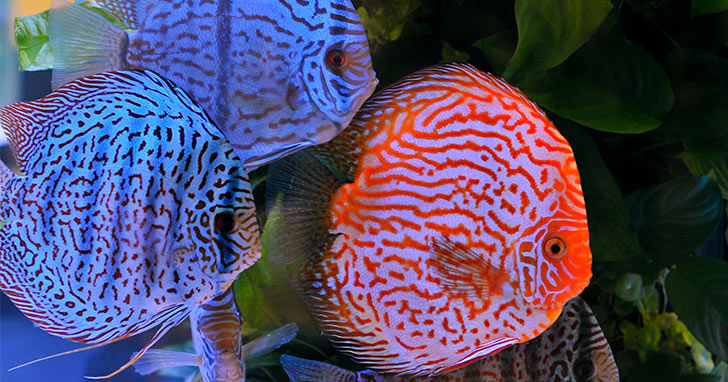How to Keep the Perfect Discus Aquarium

In the wild, Discus thrive in rivers of South America with naturally soft, acidic water. The key to raising Discus in captivity is matching these water conditions. Most Discus are comfortable in water with pH ranging from 5.0-7.0, total hardness from 1-4°dKH, and temperature from 82-84°F. Discus are very sensitive to ammonia, nitrite, and changes in water temperature and quality. Thus, it is important to keep their aquarium water exceptionally clean, and temperature constant. To provide the stable conditions Discus need to thrive, their aquarium needs to be set up with the most efficient and reliable equipment available. Make frequent water changes to promote fish health Regular water changes - the more frequent the better - are essential for keeping Discus in good health. They help remove dissolved organic compounds which promote poor water quality. To create the large supply of prepared water you need for frequent changes, we recommend use of a separate holding tank or aquarium equal to the size of your primary aquarium. Here you will prepare the water by removing the chlorine or chloramines, adjusting the pH and hardness to desired level, and heating the water to match the temperature in your Discus aquarium. To prepare the water in your holding tank, we recommend a Reverse Osmosis (RO) unit to remove all hardness and toxins from the water. RO units filter out up to 99% of minerals, chemicals, and nutrients found in tap water by forcing tap water through a semi-permeable membrane. No equipment is more effective in helping create ideal water conditions. Read Choose the Best Reverse Osmosis Unit for Your Needs. You should add a buffer to keep the pH of your RO water stable. We recommend use of two products in combination: Discus Buffer and Neutral Regulator. These give you the flexibility needed to maintain pH below 7.0. Also, a good digital pH monitor is recommended for all Discus keepers. Provide a large aquarium with room to grow Young Discus are small, but they grow fast. In a large aquarium some varieties can reach over 8 inches in length. If you want your Discus to reach their full adult length, an aquarium of 50 gallons or more will accommodate 4-5 adult fish. Plants and substrate are optional Most Discus keepers find it easiest to maintain an "empty" aquarium - the thinnest of possible substrate, or none at all, no plants, and minimal decorations. This places the emphasis on the beauty of the fish. However, if the thought of a barren aquarium does not appeal, keep in mind that, with care, you can add plants and other species of fish. Non-aggressive, relatively slow moving species such as Cardinal or Neon Tetras make good mates. The soft water and the high water temperature in your Discus aquarium limit your plant options. Only a select number of plants will thrive in these conditions. Some of the plants you can use include Amazon Sword Plant, Anubias nana, Water Sprite, and Java Ferns. Should you wish to grow plants, use a substrate designed for the planted aquarium such as Flourite. Select quality filtration units and maintain them regularly Both mechanical and biological filters are essential. Because Discus come from slow moving waters they are not comfortable in fast flows. Thus, you do not want to select an overpowered filter. Under-gravel filters should never be used in a Discus Aquarium. Canister filters are a top choice for Discus aquariums because they can be filled with a range of media to create optimal water conditions. Also, to help prevent the loss of Discus young, a sponge pre-filter should be placed on the canister filter intake. Maintain stable water temperature Discus require warmer water than found in the standard freshwater aquarium. Two items, a reliable and accurate heater and thermometer, are musts. If the temperature drops more than a degree or two below 84°F, your fish can become susceptible to stress and parasitic infestations. Calibrate the lighting The right lighting can enhance the brilliant colors of your fish. Planted tanks will require between 2-5 watts per gallon depending on the species of plants selected in order for them to grow successfully. Deep aquariums may require more wattage per gallon, but, because Discus prefer moderate lighting, don't overdo it. Keep back-up equipment on hand Because equipment failure is always a possibility, it is wise to have an extra heater and pump on hand. Do not over-populate your aquarium Discus are peaceful by nature, and do not compete well with other more aggressive species. Many enthusiasts report good success with Discus-only aquariums, stocked with 4-6 fish. When making your selection, avoid very large or very small fish. Discus of about 2-4" seem to acclimate themselves with less difficulty. Provide quality nutrition Discus are carnivores, and prefer a varied diet. Most do well on a diet of frozen bloodworms and brine shrimp, as well as a good quality pelleted food. Because Discus have short guts, it is better to feed them small amounts two or three times a day rather than one large daily meal. With the right set up and care, your discus can be long-lived and the envy of every guest or fish enthusiast. |
|
|




